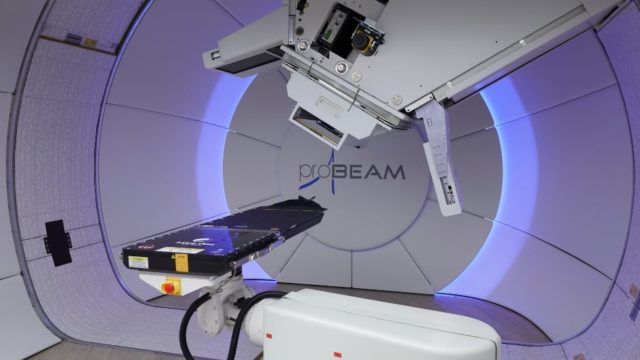
Reducing the risk of long-term heart problems later in life from cancer treatment – the role of proton beam therapy
The PARABLE trial will compare proton beam therapy (PBT) with photon radiotherapy to see if it predicts reducing the risk of long-term heart problems later in life for patients with breast cancer. NCRI’s Clinical and Translational Radiotherapy Research Working Group (CTRad) has supported the trial throughout its development providing invaluable feedback.
Proton beam therapy can be more accurately targeted than photon radiotherapy, delivering a large burst of energy at the target. As a result, the healthy tissue surrounding the tumour receives a lower dose, potentially reducing the risks of side effects in normal tissues such as the heart.
Following £250m investment from the UK Government, the UK has two NHS proton beam therapy centres at The Christie Hospital in Manchester and University College London Hospital.
CTRad has been working on developing a strategy for proton beam therapy research in the UK since 2015, before the centres were built, to ensure the cancer research community could seize the research opportunities following the opening of the centres. By setting up a proton beam therapy clinical trials strategy group, CTRad has established a community of researchers in this innovative area. The group now promotes and assists the development of high-quality clinical studies to demonstrate the benefit of proton beam therapy.
Some breast cancer patients who receive radiotherapy as part of their treatment receive an unwanted dose of radiotherapy to healthy tissue such as the heart. This increases the small risk of severe heart problems many years later. The PARABLE trial will compare proton beam therapy with photon radiotherapy to see if proton beam therapy predicts reducing the risk of long-term side effects in these patients.
Proton beam therapy has been used to treat breast cancer in other countries, but it hasn’t been compared directly with radiotherapy. To show a benefit to patients, a randomised clinical trial is needed.
“Around 33,000 breast cancer patients per year need radiotherapy as part of their treatment. However, a proportion of these patients are less well-served by radiotherapy, receiving less radiotherapy dose to the tumour, reducing the likelihood of a cure and an unwanted dose to healthy tissue such as the heart, which increases the risk of long-term heart problems later in life.”
The concept for the PARABLE trial was developed at CTRad’s first proton beam therapy collaborative workshop organised by CTRad in 2016 and has since undergone significant development. It has been discussed at a further two NCRI Breast Group meetings and four CTRad proton beam therapy workshops which provided invaluable feedback from researchers and patient representatives.
Researchers faced a challenge designing a trial to show that proton beam therapy reduces rare but life-threatening side effects such as long-term heart problems later in life. To measure the number of heart problems that occurred many years after radiotherapy would require many thousands of patients and would take 15-20 years, something which is unfeasible. Therefore, the researchers designed a novel and patient-centred trial to measure average heart dose as a short-term predictor for later heart problems. This involved working with UK experts in radiotherapy-induced cardiac toxicity and patient advocates.
In addition to average heart dose, patients also expressed the importance of measuring shorter-term side effects to the breast and surrounding tissue, to ensure these were no worse following proton beam therapy than photon radiotherapy.
“CTRad has been instrumental to the success of this study. Because CTRad had an established community of proton beam therapy researchers early in the UK research journey, they could facilitate bringing together a large group of interested researchers. Everyone was committed to working together to design a UK breast cancer proton beam therapy trial.”
“PARABLE represents the second PBT trial developed and managed at ICR-CTSU. The TORPEDO study in head and neck study has been pioneering and enables shared learning both in its design and in devising feasible trial procedures with benefits for the CTU, NHS referring sites and the PBT sites ultimately to make it easier for people who are enrolled.“
“The PARABLE Trial is an innovative and efficient way of evaluating the extent to which proton beam therapy can reduce long-term radiotherapy-associated cardiac problems in the small group of breast cancer patients at higher risk of such effects. Developing, funding and launching this trial has been a monumental collaborative effort between patients and professionals working in breast cancer radiotherapy throughout the UK and beyond.”
The PARABLE trial has received £1.3m funding from the NIHR Efficacy and Mechanism Evaluation (EME) Programme.
“Well designed proton beam therapy trials are needed to determine if proton beam therapy offers an advantage to patients over photon radiotherapy. I’m really pleased to see the PARABLE trial funded and I’m glad the groundwork laid by CTRad to create this community of proton beam therapy researchers is resulting in UK proton beam therapy trials.”